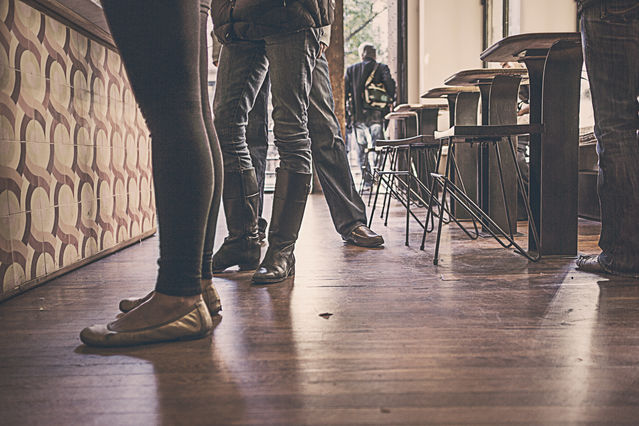Motivation
Goals, Girls and Gratitude
An hour in a chocolate shop reveals the future.
Posted January 4, 2019

Every January I identify goals for myself. The decision-making has, over the years, become fun, with more creativity than it had initially when I lacked confidence about marriage, career, and productivity. Now I’m full of hope, which lightens anxiety and depression.
This year I take myself to a chocolate shop for a latte. I enjoy the coffee while curled up on a couch in the café. I am too cold until I spot an alpaca blanket neatly folded on the edge of the sofa for just such occasions. I open it, noting its beauty in color, texture, and pattern as I wrap it around myself. I feel my body relax into the sensual environment.
I open my journal, glancing very briefly at entries from 2018: entries about progress on my book about grief, which is about to be pitched to publishers, entries about my mother’s decline and death, my grief for her the major experience of my year, which culminated in a letter to her written at Thanksgiving, nine months after her death. I smile at the bookends of our attachment: for nine months in 1962, she was bringing me into being, and for nine months in 2018 I was letting her go from this world.
And then I settle in to think about where I am now, and where I want to take myself in 2019.
I see myself as a body, mind, heart, and spirit, and know that health requires keeping all four dimensions of my life in balance. That balance is an overarching goal every year.
The goals for my body are predictable but also allow me to recognize the changes I made in 2018 by starting to use an insulin pump and continuous glucose monitor instead of multiple shots of insulin. My diabetes management is much improved, and my physical goals all focus on maintaining motivation to exercise, reduce stress, follow a low-carb diet, watch my weight, take my medication, get enough sleep. I am most motivated to do those things when I track my progress daily with the charts and graphs the insulin pump provides.
I realize, suddenly, as I take a sip of the delicious latte, that there is nothing on the list of physical goals about physical appearance, nor about mood swings. “Ah,” I think, “I do believe that I am through menopause!” I glance over at the high school girls sitting near me in the café. They are talking about homework assignments, fashion and make-up, boyfriends and girlfriends. I notice the tension in their body language and their laughter, and feel so glad to not be in adolescence anymore.
The goals for my mind also build on the work of 2018: write my book, blog, talk more with an old friend, now a philosophy professor who directs a program on philosophy and literature. We live far apart and started Skyping in 2018, and some of the most exciting intellectual moments of 2018 occurred in the midst of casual conversation with her. When I tell her about an idea I am struggling with in my book, her comment makes the problem resolve into sense. The last time we talked, she mentioned a poet she has started to study; when I start to read Norman MacCaig my passion for poetry blossoms again. Many people have contributed to my cognitive development in 2018. I start to scribble a list.…
The goals for my heart are harder to define, but ultimately focus on three things: committing time to family and friends, knowing that my relationships sometimes get short shrift in my busy life; continue to cultivate openness in my writing; and explore my emotions about money (none of which is pleasant or straightforward).
With pleasure, I recognize that most of my family and friends will have wisdom to share on that subject, including advice on how to be less emotional about money, something I do not yet know how to do. And since most people have trouble, as I do, in their relationships with money, I can try to disclose my experiences in writing, even though the thought of doing so stirs some fear in me. I will anticipate empathy, and encourage laughter, as I write about my financial foibles.
The goals for my spirit are more clear than they have been in recent years. I want to focus on religious practice—regular attendance at services, now that I have found a spiritual home that addresses social justice in rigorous, inspiring ways—and on experimental practice of prayer until I find a way that works for me and gets woven into my daily life.
And I want to practice deliberately turning the things I cannot control, but currently expend a lot of energy on, over to the power I think of as the Universe, a combination of God and Science. My elderly friends are, like my mother, going to die when they die, regardless of how much I worry about them dying, and my fear of loneliness only makes us anxious, and avoidant, in our moments of togetherness.
In the background, the high school girls are laughing, the gorgeous chocolate candies are wafting sweetness and spice, the blanket is warming my legs and lap—but not my shoulders. The latte is gone; it’s time to go.
I close my journal, and pause a moment to look at its worn red cover, spotted here and there with drips of coffee and stray pen marks. I hold it to my chest a moment, thinking of all the life it holds: my mother’s 90 years, my own 56, the coming year. One of the girls is watching me. As I smile at her and she smiles back, I think of all the women in mid-life who smiled at me when I was 17. I realize now that they felt connected to me, a girl not unlike the girls they’d been, even though I then saw them as ancient, unlike anything I would ever become.
A wave of gratitude, followed gently by optimism, rolls over me. “Thank you, Universe,” I whisper. “Thank you for all this time, all this life, and hope.”





